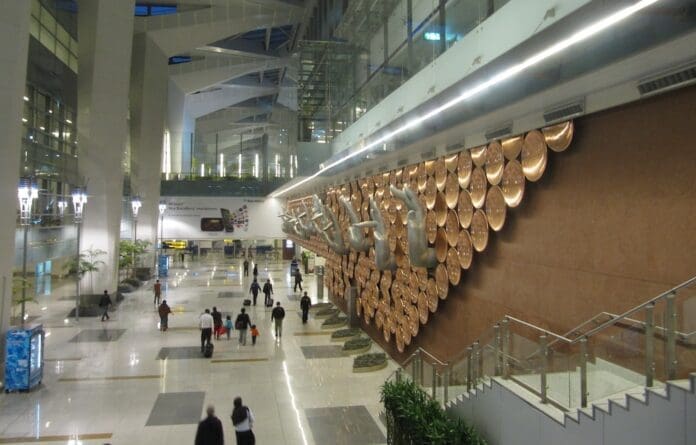Delhi’s Indira Gandhi International Airport is on track to unveil a cutting-edge 7.7-kilometer automated people mover (APM) by 2028, enhancing its transportation capabilities. This innovative air train will connect Terminals 1, 2, and 3, predominantly through an elevated route designed to keep construction costs manageable. With four strategically located stops, the system aims to provide seamless terminal transfers without imposing additional fees on passengers.
The air train’s construction will take place below the only elevated taxiway in India, allowing aircraft to taxi above while the train operates beneath. Delhi International Airport Limited (DIAL) has initiated the tender process for the construction of this vital transport link, which will traverse runway 28 to connect Terminals 2 and 3 to Terminal 1.
The APM will consist of 5.7 kilometers of elevated track and 2 kilometers at ground level, with the latter sections strategically positioned before Terminal 1 and underneath the elevated taxiway. A skywalk is also planned at the cargo station, providing a direct connection between the air train and the cargo terminal.
To keep the project’s costs in check, DIAL opted against including an underground section. Construction costs in India are estimated at around ₹250-300 crore per kilometer for elevated segments, ₹150-200 crore for surface tracks, and ₹500-600 crore for underground components. These figures encompass all project expenses, such as construction, train systems, signaling, and civil works.
The total expenditure for the air train project is projected to reach ₹1,500-1,600 crore. Notably, the aviation ministry, during Prime Minister Modi’s second term, prohibited the imposition of extra charges on passengers to finance the initiative, instructing the airport operator to complete the construction first before seeking to recover costs.
DIAL is currently evaluating bids based on cost estimates and potential revenue-sharing options. Globally, air trains are often free for passengers, with costs covered through airline fees and user charges. Previously, Mumbai Airport charged a metro fee of ₹20 for domestic flights and ₹120 for international departures to support metro connectivity, but this practice was discontinued once funding goals were met.
Initially, the government suggested reducing the number of proposed stations from six to four to facilitate quicker transfers and enhance security. The final tender now specifies four stops: Terminal 2/3, Terminal 1, Aerocity, and Cargo City, with potential future expansions indicated in Aerocity.
DIAL’s tender document outlines: “DIAL plans to implement an elevated and at-grade APM system at Delhi Airport using a design, build, finance, operate, and transfer (DBFOT) model. This APM system aims to deliver fast, reliable, and seamless connectivity between Terminal 1 and Terminals 2/3, covering an approximate distance of 7.7 kilometers via Aerocity and Cargo City. In addition to providing essential connectivity between terminals, the APM system will improve passenger convenience, enhance the Airport Service Quality (ASQ) score, and lower the carbon footprint.”
The introduction of this air train is set to significantly improve connectivity and the overall passenger experience while contributing to a more environmentally friendly airport operation.


Recent Comments